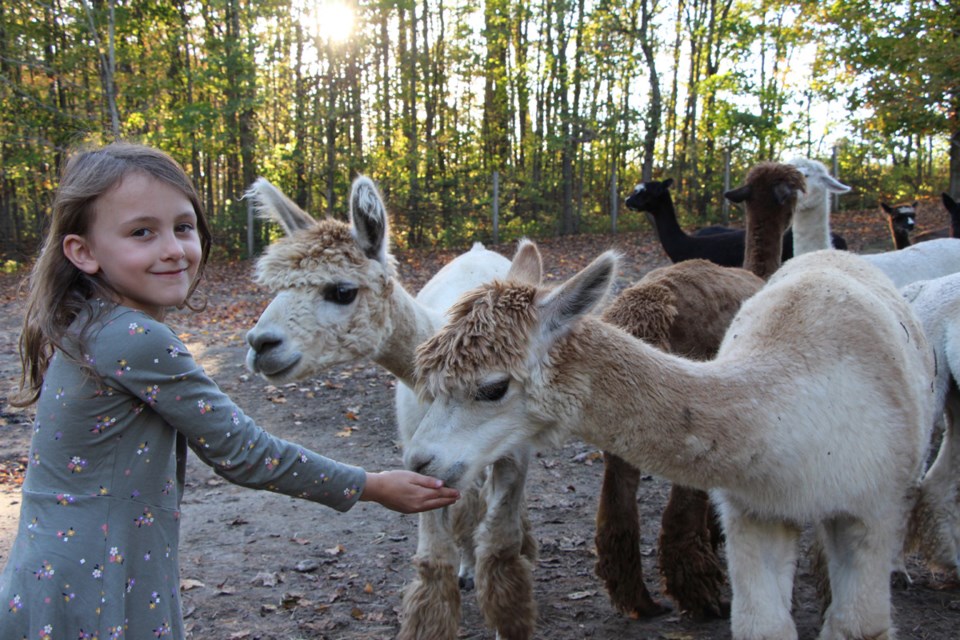Imagine seeing a baby alpaca being born and then having the honour of naming the newest member of the herd.
Earlier this year, a family visiting a local alpaca farm had this unique experience.
Alex and Cara Davidson, owners of Davidson Estate Alpacas, were conducting a tour when they noticed one of their female alpacas pacing back and forth a distance away from the others. This was noticeable because alpacas typically stick together as a herd.
“All of a sudden, I noticed legs and a nose coming out,” says Cara.
She went on to explain that the birthing process for alpacas is generally very simple, following a gestation period of about 345 days.
“They typically give birth during daylight hours and not in the rain. You just get out of their way and they do it. Within an hour the babies are walking on their own and nursing," she says.
With this particular birth, the visiting family, fascinated by the new life they witnessed, were able to see the newborn take his first steps.
“Oh, he’s a ginger,” they said. “You should name him Harry.”
The name stuck and was perfectly suited to Meghan, who was born a week earlier and named in memory of a friend.
Harry and Meghan are two of the 18 alpacas that make up the herd at the Davidson farm, located in Oro-Medonte between Hillsdale and Craighurst.
What started out as a paddock with five alpacas has turned into a busy enterprise with the Davidsons now breeding and raising their own alpacas and sharing the delightful animals with others through tours and adventure walks.
Alex grew up in a farming family and once he and Cara moved to their rural property, they wanted to acquire livestock and decided on alpacas. The plan was to create products from the alpaca fibre, described as being “as fine as cashmere, soft, silky and much warmer and stronger than sheep's wool,” according to Alpaca Canada.
“We went to an open house at our parent (alpaca breeder) farm, Arriba Linea, and were amazed by the alpacas,” says Cara. They’re easy to look after, have friendly personalities, gorgeous fibre, and they’re cute!”
Indigenous to the South American countries of Peru, Bolivia and Chile, alpacas are well-insulated and happy to live outside all year. Their personalities are also well-suited for interacting with people.
“They’re very gentle. Our kids, who are four and seven, can just walk around the paddock with the girls – there’s not many animals that you can just let a four-year-old interact with like that,” says Cara.
Over the past couple of years, the Davidsons decided to share their enjoyment of the herd with others.
“We didn’t realize how unique this is. People are really interested in visiting and learning about alpacas. It started with friends and family, but once the Oro-Medonte Chamber of Commerce recruited one of the herd, Monty, to act as its mascot, things just exploded.”
The Davidsons offer tours year-round where visitors get to enter the paddock, feed the alpacas (as well as the ducks and chickens), take selfies and learn about the unique animals.
“People are surprised you can get so close to them, it’s not like a zoo or a petting farm with fences. Once the animals are haltered, they’re fine with snuggling and photos. And they don’t bite because they only have bottom teeth, so feeding them from your hand is easy and safe,” says Cara.
“Everyone asks a million questions and they always say they leave here having learned a ton about alpacas. Alex is really animated when he talks about them!”
In addition to tours, the Davidsons offer adventure walks, where two or three alpacas are haltered for a 30- to 45-minute walk around the wooded property.
Visitors can also purchase alpaca products at the farm, including socks, hats, headbands and custom-made items. All products are made using the fibre from the Davidson herd.
Cara explains the herd is sheared once a year.
“You need an expert at shearing. The person we use drives his RV across Canada to offer the mobile service – it’s a full-day event. We corral the herd, halter them, walk them to the shearing table and then we end up with bags and bags of fibre.”
The fibre is sent to a mill to be made into yarn and then knitted and crocheted into soft, warm products.
“We’ve received lots of suggestions over the years and are excited about trying new activities with our visitors,” says Cara. “Maybe we’ll try alpaca yoga.”
The Davidsons have also found that alpaca visits are well suited to groups of people with challenges or disabilities because of the calm nature of the herd.
“They are super calming. If I’ve had a stressful day, I just come out here, feed them and hang out with them. It always makes me feel better,” says Cara. “It’s also just nice to get outside and do something that’s active. We are so happy to be able to share what we enjoy with other people.”
To learn more about Davidson Estate Alpacas or to book a tour or walk, visit their Facebook page.



